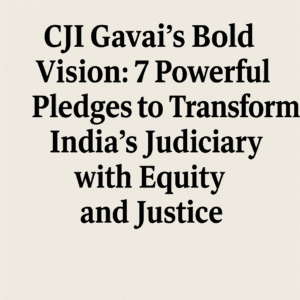CJI Gavai’s Bold Vision: 7 Powerful Pledges to Transform India’s Judiciary with Equity and Justice
In a historic milestone, Justice Bhushan Ramkrishna Gavai, India’s first Buddhist Chief Justice, vowed to prioritize the rule of law and bridge constitutional promises with grassroots realities during his felicitation by the Bar Council of India. Emphasizing social justice, he underscored the Kesavananda Bharati judgment as a cornerstone for resolving constitutional tensions, advocating a balance between Fundamental Rights and Directive Principles. His journey—from an aspiring architect to the Supreme Court, inspired by Dr. B.R. Ambedkar and his father’s unrealized legal dreams—reflects a career rooted in resilience.
Justice Gavai called for greater inclusivity, urging High Courts to recommend more women and marginalized candidates for judicial roles, noting that only 13% of High Court judges are women. Pragmatic about media engagement, he avoids interviews to focus on actionable outcomes. The BCI highlighted expectations for merit-based appointments, stressing empowerment for those without privileged connections. Gavai’s tenure, though brief, signals a commitment to transforming India’s judiciary into an accessible, equitable institution aligned with constitutional ideals.

CJI Gavai’s Bold Vision: 7 Powerful Pledges to Transform India’s Judiciary with Equity and Justice
In a heartfelt address at his felicitation ceremony hosted by the Bar Council of India (BCI), newly appointed Chief Justice of India (CJI) Bhushan Ramkrishna Gavai underscored his dedication to upholding the Constitution and bridging the gap between legal ideals and grassroots realities. The 52nd CJI, who took oath on May 14, becomes the first Buddhist to helm India’s judiciary, marking a historic milestone in the nation’s diverse legal landscape.
A Constitutional Compass: Rule of Law and Social Justice
Justice Gavai emphasized his commitment to ensuring that the Constitution’s promises—particularly social and economic equality—reach marginalized communities. “The vision of our Constitution must transcend courtrooms and touch the lives of every citizen,” he stated, aligning his tenure with the ethos of Dr. B.R. Ambedkar, a pivotal architect of the Indian Constitution.
He highlighted the Kesavananda Bharati judgment (1973) as a lodestar for resolving constitutional conflicts, noting its role in balancing Fundamental Rights and Directive Principles of State Policy. “These are not opposing forces but complementary pillars that form the soul of our democracy,” he remarked, signaling a judicial philosophy rooted in harmony over hierarchy.
From Architecture to Advocacy: A Personal Journey
In a rare personal reflection, Justice Gavai shared how his father’s unfulfilled legal aspirations and admiration for Ambedkar steered him away from a childhood dream of architecture. “My father’s sacrifices during India’s freedom struggle inspired me to embrace law—a profession he saw as a vehicle for social change,” he recounted. His journey from Nagpur’s trial courts to the Supreme Court, including a pivotal mentorship under former CJI Sharad Bobde, underscores a career shaped by resilience and mentorship.
Championing Inclusivity in the Judiciary
A vocal advocate for diversity, Justice Gavai urged High Courts to prioritize recommendations of women and candidates from SC/ST/OBC backgrounds for judicial appointments. “If suitable candidates aren’t found in lower courts, let’s look to the Supreme Court Bar, where brilliant women advocates are already practicing,” he proposed. This push aligns with India’s broader struggle for gender parity—women currently constitute just 13% of High Court judges and 34% of district judiciary roles.
Media Reluctance and Pragmatic Leadership
Addressing his aversion to media interactions, Justice Gavai quipped, “Promises made in interviews often become fodder for criticism.” His pragmatic stance reflects a focus on actionable outcomes over rhetoric, a lesson perhaps learned from predecessors who faced scrutiny over unfulfilled pledges.
BCI’s Call for Merit and Representation
BCI Chairman Manan Kumar Mishra echoed expectations for Gavai’s tenure, stressing merit-based appointments while advocating for social representation. “The judiciary must empower those without ‘godfathers’—individuals whose merit speaks louder than connections,” he asserted, highlighting systemic barriers that persist in legal career advancement.
Implications for India’s Judicial Future
Justice Gavai’s tenure, though brief (ending November 2025), arrives at a critical juncture. With over 50 million pending cases and debates over judicial transparency intensifying, his emphasis on accessibility and inclusivity could redefine public trust in the institution. His personal narrative—a testament to overcoming caste and class barriers—adds symbolic weight to his leadership.
As CJI Gavai steps into his role, the legal fraternity watches keenly to see how his blend of constitutional idealism and grassroots pragmatism will shape India’s pursuit of justice. In his words, “The Constitution is not merely a document but a covenant with the people—one we must honor daily.”
You must be logged in to post a comment.